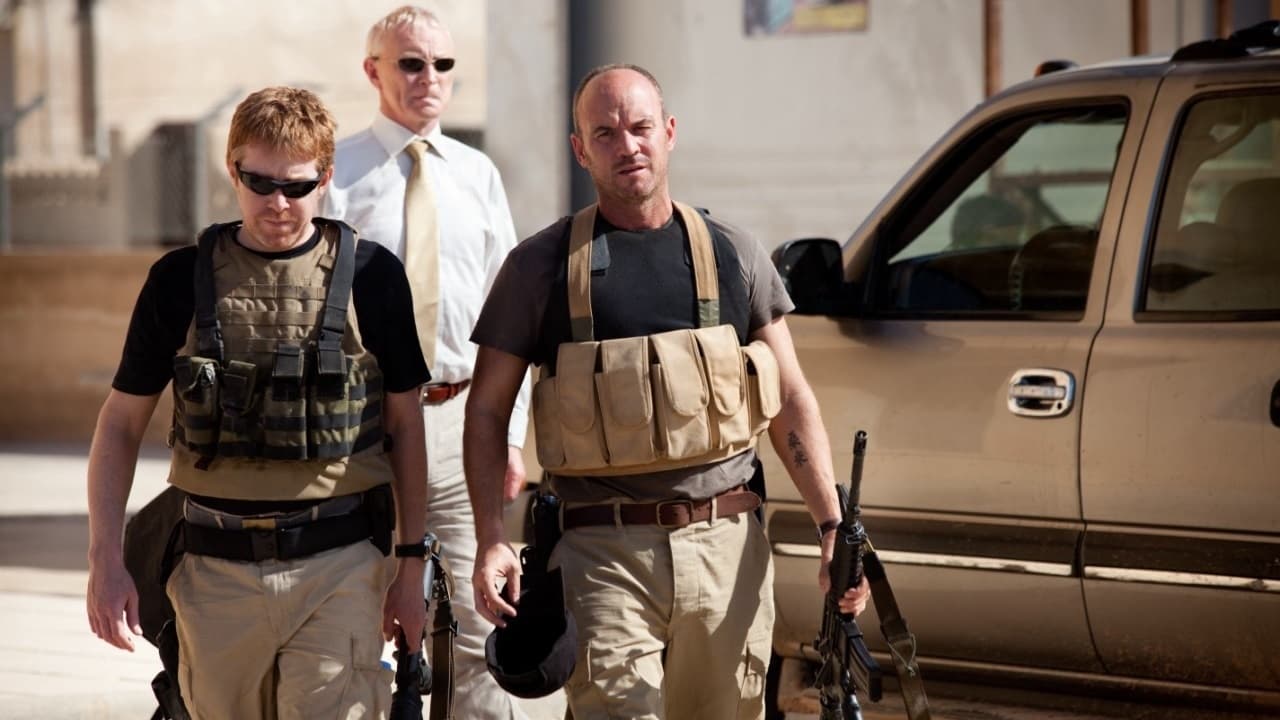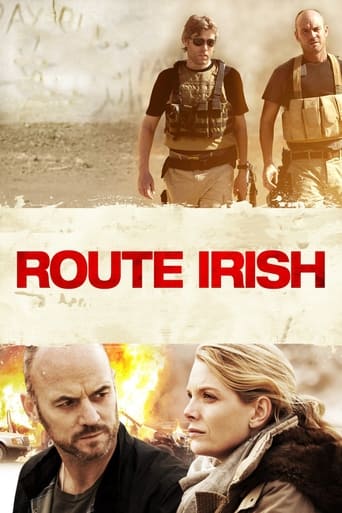

Purely Joyful Movie!
... View MoreAm I Missing Something?
... View MoreThis is a tender, generous movie that likes its characters and presents them as real people, full of flaws and strengths.
... View MoreI cannot think of one single thing that I would change about this film. The acting is incomparable, the directing deft, and the writing poignantly brilliant.
... View MoreA couple of years ago, Ken Loach withdrew his film Looking For Eric from MIFF in protest at the Israeli funding of the Festival, but this year he seems quite content to leave his latest film alone. Route Irish is more of a political thriller about murder, conspiracy, cover-ups, and revenge, although it is still suffused with Loach's usual angry world view and social consciousness. Written by Loach's regular collaborator Paul Laverty, Route Irish takes aim at the private security contractors who are profiting from the war in Iraq, the "cowboys" whose behaviour is not regulated by military discipline or codes of conduct. Loach doesn't pull; his punches in examining the role played by private mercenaries in the ongoing and unpopular war. Like Paul Haggis' In The Valley Of Elah this is a topical film that is critical of the war in Iraq and the murky political agendas that drive it. The title refers to that stretch of road in Iraq that runs from Baghdad airport to the allied "green zone", and which is regarded as the most dangerous road in the world. When former SAS soldier Fergus (Mark Womack, a veteran of British television) learns of the death of his best friend Frankie (stand-up comic John Bishop) caused by an IED along that road, he refuses to accept the official version. Refusing to believe that it was a simple case of "being in the wrong place at the wrong time," Fergus sets out to uncover the truth. He believes that his friend's death was a deliberate attempt to cover up a massacre of civilians by contractors. Cinematographer Chris Menges has filmed in Liverpool and Jordan, doubling for Iraq, which lends an authenticity to the material. The film is full of Loach's usual signature touches – hand held camera, naturalistic approach, seemingly ad-libbed dialogue and a scathing howl of outrage against injustice. As the central character Womack delivers an intense and angry performance, and he spends a lot of time shouting his sometimes incomprehensible dialogue. Route Irish is his most topical film for some time, and has the same sense of urgency as his earlier political thriller Hidden Agenda. While it may not be amongst Loach's best films, Route Irish is still powerful stuff!
... View MoreI have been a bit of a fan of the work of Ken Loach for a while now, ever since I saw Kes (made in 1969, but I saw it much later) and more recently Looking for Eric (2009). This one, although still good, failed to quite hit the mark (for me). There were several aspects of it that seemed incomplete. I'll tell you more after this very brief summary.Whilst working for a security firm in Iraq, in 2007, Frankie is killed. His best friend, Fergus, is devastated and feels there is something not quite right about the circumstances of his death. A former mercenary himself, he begins his own investigation. Enlisting the help of Frankie's widow, Rachel, and an Iraqi musician, Harim, he begins to piece together the events leading up to Frankie's death. I won't say any more or the Spoiler Police will be shooting at that taxi I'll be taking home on Thursday night. Oh, I should also mention, just for completeness, that 'Route Irish' is the code name used for the route between Baghdad Airport and the Green Zone.Set in Liverpool and with an extremely gritty edge to it, there are no punches pulled in this realistic drama. Of course budget constraints mean most of the action has to take place in the UK, but there is a fair bit of archive footage of events in Iraq at the time to fill the gap. Be warned though, some of it is quite graphic. As far as performances go, well, both Mark Womack as Fergus and Andrea Lowe as Rachel were excellent. A lot of the dialogue is ad-libbed and I thought they both did an excellent job! John Bishop, better known as a comedian here in the UK, plays Frankie (in flashback) and he did a pretty good job too. I thought Talib Rasool as Harim was very good as well.Over all, it just failed to hit the mark. I think I found the ending a bit of a let-down but sadly I cannot talk about it here. It did have its good points though and I did find it quite enthralling up to a point, but it was a little too long for me. It's a shame because I really wanted to like this one, but then you can't have everything I suppose. I will still deem it worthy of a viewing, but be warned of a lot of swearing and some graphic content.My Score: 6.4/10.IMDb Score: 6.3/10 (based on 1,051 votes at the time of going to press).Rotten Tomatoes Score: 73/100 (based on 26 reviews counted at the time of going to press).
... View MoreI have to confess that I've never been a fan of Loach . If a film director says the most important aspect to film making is hearing if the dialogue is authentic then perhaps the director should be working in radio ? ROUTE IRISH is a film that opened to some bad reviews even from people forgiving to Loach and his politics . Make no mistake the politics here sink the movie which is probably the worst film in the director's long resume One can't help thinking if the problem is the premise or the plotting . It's certainly a combination of both and both faults can be squared at the feet of screenwriter Paul Laverty who wants his cake and eat it by giving us gritty kitchen sink politics in a BOURNE type of plot . You can perhaps see a Hollywood type of blockbuster where George Clooney finds his best friend , a security contractor , has been killed in Iraq in dubious circumstances and Georgious George wants to get to the bottom of it . Unfortunately the only person the screenplay seems written for is not George Clooney but George Galloway Mark Womack is cast as anti-hero Fergus Molloy and you got to feel slightly sorry that Womack has not been given a convincing character to perform . Molloy is a veteran of the Iraq war , then he reveals he was in SAS operations but for some ridiculous reason he then spouts slogans that would feel at home at a Trotskyite useful idiot convention " Why would the police care about a taxi driver . There's one million dead in Iraq " Well only if you listen to the discredited figures of John Hopkins University . Most observers including those like Iraq Body Count and Wikileaks which were opposed to the war give a figure closer to 105,000 " I carried out operations with the Americans in Bahgdad . I'm telling you if the Iraqis weren't for Al Qaeda at the time they now will be " Not actually correct . Even today you watch the news and wedding parties in Sunni heartlands have seen massacres by terrorists . The victims are often relatives of Sunni warlords who changed sides during the Iraq insurgency . It must be very painful for useful idiots to learn that if the one thing Iraqis hate more than American neo-imperialism then it's the murderous barbarity by Al Qaeda . AQ failed to take root in the country down to the fact that not even the most misguided Baa'thist nationalist can tolerate them as an allySo in effect the protagonist lacks any credibility down to a lack of back story or consistency . He's impossible to believe in as anything more than a platform for Laverty's political views . And it was this spouting of incredibly unconvincing dialogue that caused critics to suggest Loach and Laverty to part ways . I for one will be happy to see Laverty find his true calling in life which is handing out political pamphlets to equally useful idiots . I also wonder since he's so opposed to market forces if Laverty got paid for his screenplays ? I mean he's effectively saying " Rich people bad . Poor people good " so isn't there something hypocritical afoot ?And perhaps the most hypocritical thing is that Loach and Laverty are profiting from the invasion of Iraq by making a film about it ? They were probably thinking they were ironic in making the water board torture scene but the irony of the whole film seems lost on them
... View MoreThe private companies with special tasks in Iraq are since long a problem. They aren't bound by the rules which regular armed forces have. They also exist in Britain and this new Ken Loach movie is about them.A taxi with two children is destroyed. Later one of the contracted soldiers is killed and his friend tries to find out what happened. Who are the bad guys here? That warhead in the barrack or somebody or somebodies much higher in the hierarchy? This is not a typical Ken Loach drama, since it's on the surface more of a typical war thriller than an outcry about social injustice. But social injustice becomes the main theme. Loach is one of the few remaining outraged society commentators. We shall be glad we have him.
... View More